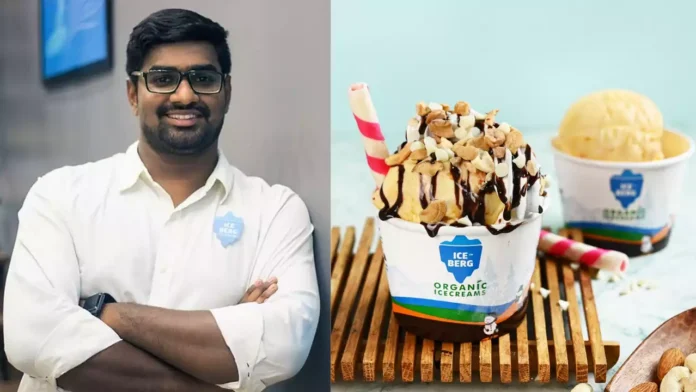Iceberg Organic Ice Cream, an 11-year-old brand from Nellore, a tier 3 city in Andhra Pradesh has carved a niche in the Indian ice cream market by pioneering the country’s first and only organic ice cream brand. As the demand for health-conscious and unique products rises, Iceberg’s use of A2 milk and innovative business models sets it apart from competitors.
Iceberg’s decision to use A2 milk as a primary ingredient is a strategic one aimed at offering a healthier alternative to conventional ice creams. A2 milk, known for its easier digestibility and health benefits, distinguishes Iceberg’s products in a market crowded with standard dairy options.
Suhas B Shetty, Founder of the brand explains, “Using A2 milk does make our products more expensive, but it’s about providing real health benefits along with the pleasure of enjoying ice cream. We source A2 milk from local farmers, paying them a premium price of about 60 rupees per liter, compared to the 40-45 rupees for regular milk. This not only supports local agriculture but also ensures the highest quality for our products.”
A2 milk is usually sold for approximately INR 120-150 per liter in cities like Bangalore, Hyderabad, Chennai, Delhi, and Mumbai. However, in cities like Nellore, there is no distinction between A1 and A2 milk, and it’s sold at the regular price of 50-55 rupees per liter.
According to Shetty, the goal is to upsell the same product by leveraging business model and entrepreneurship skills. Despite the higher costs and logistical challenges associated with A2 milk, Shetty plans to maintain centralized manufacturing in Nellore, aiming to produce 35,000 liters of ice cream per day.
Continue Exploring: From scoops to sundaes: Ice cream sales set to soar 15-20% this summer
“Currently, we have collaborated with over 3,500 local farmers. We are also reaching out to additional farmers and Farmer Producer Organizations (FPOs) to enhance their knowledge and upgrade their practices for product growth. This initiative aims to elevate their offerings, as many of these farmers currently sell their milk to dairy depots,” he said.
Flavor Innovation: Catering to Diverse Tastes
Iceberg prides itself on not just the health benefits of its products but also their taste and innovation. The brand offers a variety of flavors, including both standard options like chocolate and unique ones like sitaphal (custard apple) and tender coconut, which cater to diverse regional preferences. “Our product is the hero. I recently did a taste test on Shark Tank, comparing our ice cream with other top brands. The feedback was overwhelmingly in favor of Iceberg, which reinforces our commitment to quality,” Shetty shared.

While Iceberg’s organic and A2 milk-based products are more expensive, Shetty believes consumers are willing to pay for quality. “If you want real health benefits along with pleasure, you need to spend a little extra. We cannot dilute the quality of our ingredients,” he asserted.
Furthermore, to expand its footprint, Iceberg has adopted the “dark model” concept, particularly in North India. Dark stores, which operate without a traditional retail front, serve as fulfillment centers for online orders, enabling faster and more efficient deliveries. “Technology drives us every day,” said Shetty. “Our dark model outlets allow us to enter new markets without the overhead of physical stores. This is crucial as we expand into major cities like Delhi, Mumbai, and Pune.”
Shifting Business Models: From B2B to D2C
Initially focusing on a B2B model, Iceberg supplied stock and raw materials to physical outlets. However, recognizing the growing direct-to-consumer (D2C) trend, they have now shifted towards this approach. With over 120 physical outlets in South India, Iceberg is leveraging the dark model to penetrate the North Indian market. “Last financial year, we achieved a revenue of INR 9 crores in the B2B segment. This year, with our D2C expansion, we aim to double that,” Shetty revealed.
This bootstrapped brand has recently (end of March) ventured into the B2C market with dark model and quick commerce services. Considering the performance in the B2C sector, this translates into around INR 36 crore in total revenue, said Shetty. “Currently, with expansion plans, expected revenue will be around INR 16 to 18 crore for the current year,” he stated.
The brand has partnered with Frogo for the NCR region, covering cities like Faridabad, Ghaziabad, Noida, Gurgaon, and Delhi. Additionally, they have collaborated with kitchens in Mumbai and Pune.
Continue Exploring: FroGo rides high on booming demand for frozen treats as summer heats up, CEO Mira Jhala charts expansion plans
“These are the three key cities where we are expanding our dark model operations. For our physical model, we are focusing on Hyderabad, where we are already established. In terms of quick commerce, we are targeting six cities: Bangalore, Hyderabad, and Chennai in South India, and Mumbai, Pune, and the NCR region in North India,” he revealed.
Looking ahead, Iceberg plans to continue its expansion through both dark stores and physical outlets. The company is also exploring partnerships with quick commerce platforms like Blinkit and Zepto to ensure their products are readily available to a broader audience.
Continue Exploring: Amazon Fresh sees 43% YoY growth in ice creams and dairy beverages sales





